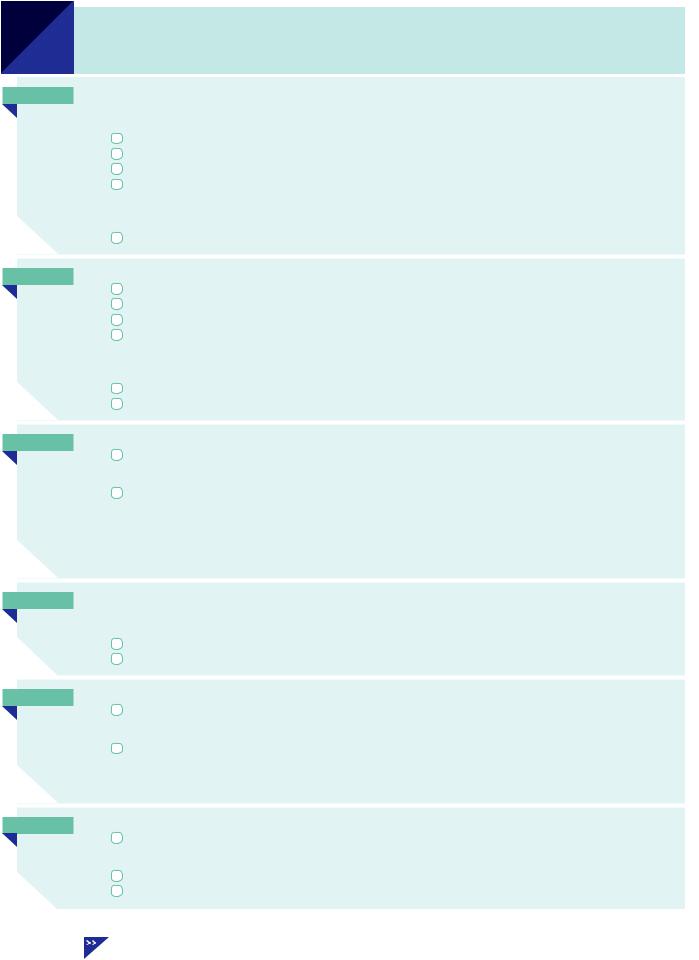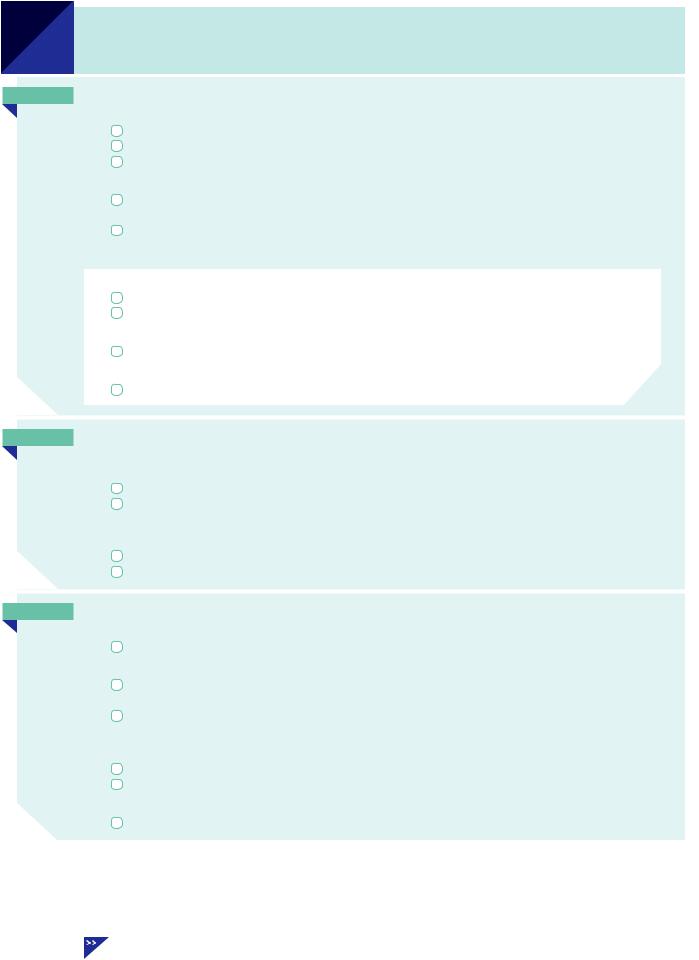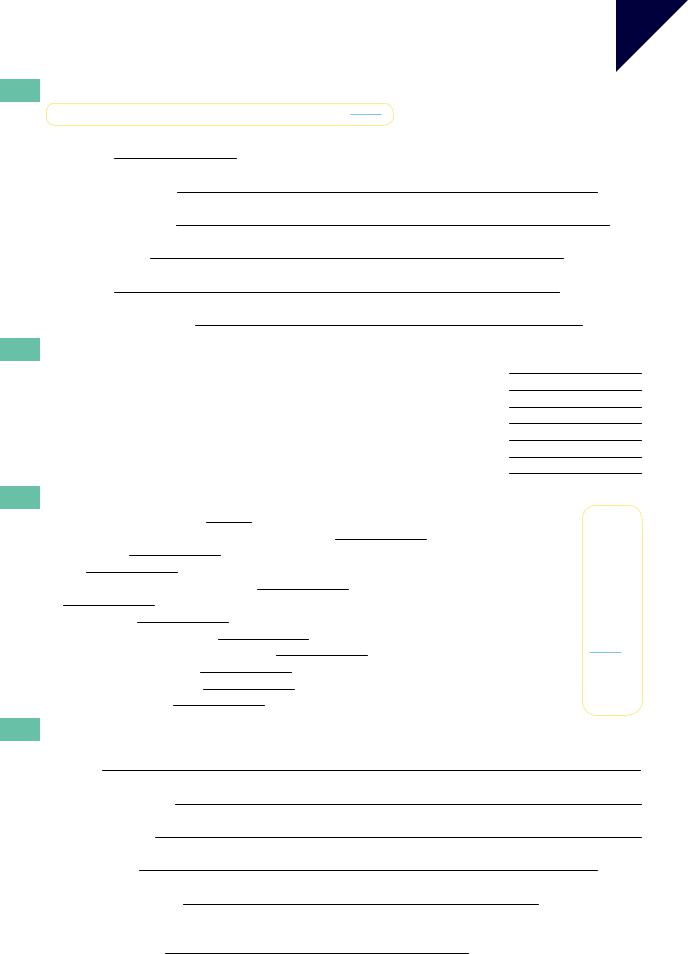
- •Contents
- •Thanks
- •To the student
- •To the teacher
- •3 Present continuous and present simple 1 (I am doing and I do)
- •10 Present perfect continuous and simple (I have been doing and I have done)
- •11 how long have you (been) … ?
- •12 for and since when … ? and how long … ?
- •13 Present perfect and past 1 (I have done and I did)
- •14 Present perfect and past 2 (I have done and I did)
- •15 Past perfect (I had done)
- •16 Past perfect continuous (I had been doing)
- •17 have and have got
- •18 used to (do)
- •19 Present tenses (I am doing / I do) for the future
- •20 I’m going to (do)
- •21 will and shall 1
- •22 will and shall 2
- •23 I will and I’m going to
- •24 will be doing and will have done
- •26 can, could and (be) able to
- •27 could (do) and could have (done)
- •28 must and can’t
- •29 may and might 1
- •30 may and might 2
- •31 have to and must
- •32 must mustn’t needn’t
- •33 should 1
- •34 should 2
- •35 I’d better … it’s time …
- •36 would
- •39 if I knew … I wish I knew …
- •40 if I had known … I wish I had known …
- •41 wish
- •42 Passive 1 (is done / was done)
- •43 Passive 2 (be done / been done / being done)
- •44 Passive 3
- •45 it is said that … he is said to … he is supposed to …
- •46 have something done
- •47 Reported speech 1 (he said that …)
- •48 Reported speech 2
- •49 Questions 1
- •52 Question tags (do you? isn’t it? etc.)
- •53 Verb + -ing (enjoy doing / stop doing etc.)
- •54 Verb + to … (decide to … / forget to … etc.)
- •55 Verb (+ object) + to … (I want you to …)
- •56 Verb + -ing or to … 1 (remember, regret etc.)
- •57 Verb + -ing or to … 2 (try, need, help)
- •58 Verb + -ing or to … 3 (like / would like etc.)
- •59 prefer and would rather
- •60 Preposition (in/for/about etc.) + -ing
- •61 be/get used to … (I’m used to …)
- •63 there’s no point in -ing, it’s worth -ing etc.
- •64 to … , for … and so that …
- •65 Adjective + to …
- •66 to … (afraid to do) and preposition + -ing (afraid of -ing)
- •67 see somebody do and see somebody doing
- •68 -ing clauses (He hurt his knee playing football.)
- •69 Countable and uncountable 1
- •70 Countable and uncountable 2
- •71 Countable nouns with a/an and some
- •74 the 2 (school / the school etc.)
- •75 the 3 (children / the children)
- •77 Names with and without the 1
- •78 Names with and without the 2
- •79 Singular and plural
- •80 Noun + noun (a bus driver / a headache)
- •81 -’s (your sister’s name) and of … (the name of the book)
- •82 myself/yourself/themselves etc.
- •83 a friend of mine my own house on my own / by myself
- •84 there … and it …
- •85 some and any
- •87 much, many, little, few, a lot, plenty
- •90 all every whole
- •91 each and every
- •92 Relative clauses 1: clauses with who/that/which
- •94 Relative clauses 3: whose/whom/where
- •95 Relative clauses 4: extra information clauses (1)
- •96 Relative clauses 5: extra information clauses (2)
- •97 -ing and -ed clauses (the woman talking to Tom, the boy injured in the accident)
- •98 Adjectives ending in -ing and -ed (boring/bored etc.)
- •99 Adjectives: a nice new house, you look tired
- •100 Adjectives and adverbs 1 (quick/quickly)
- •102 so and such
- •104 quite, pretty, rather and fairly
- •105 Comparative 1 (cheaper, more expensive etc.)
- •106 Comparative 2 (much better / any better etc.)
- •107 Comparative 3 (as … as / than)
- •108 Superlative (the longest / the most enjoyable etc.)
- •109 Word order 1: verb + object; place and time
- •110 Word order 2: adverbs with the verb
- •111 still any more yet already
- •112 even
- •114 in case
- •116 as (as I walked … / as I was … etc.)
- •117 like and as
- •119 during for while
- •121 at/on/in (time)
- •122 on time and in time at the end and in the end
- •123 in/at/on (position) 1
- •124 in/at/on (position) 2
- •125 in/at/on (position) 3
- •126 to, at, in and into
- •127 in/on/at (other uses)
- •129 Noun + preposition (reason for, cause of etc.)
- •130 Adjective + preposition 1
- •131 Adjective + preposition 2
- •132 Verb + preposition 1 to and at
- •134 Verb + preposition 3 about and of
- •135 Verb + preposition 4 of/for/from/on
- •136 Verb + preposition 5 in/into/with/to/on
- •137 Phrasal verbs 1 Introduction
- •138 Phrasal verbs 2 in/out
- •139 Phrasal verbs 3 out
- •142 Phrasal verbs 6 up/down
- •143 Phrasal verbs 7 up (1)
- •144 Phrasal verbs 8 up (2)
- •145 Phrasal verbs 9 away/back
- •Additional exercises
- •Study guide
- •Key to Exercises
- •Key to Additional exercises (see page 302)
- •Key to Study guide
- •Index

Unit
34 should 2
AYou can use should ater:
insist demand recommend suggest propose
I insisted that he should apologise.
Doctors recommend that everyone should eat plenty of fruit.
What do you suggest we should do?
Many people are demanding that something should be done about the problem.
also
It’s important/vital/necessary/essential that … should … :
It’s essential that everyone should be here on time.
BYou can also leave out should in the sentences in section A. So you can say:
It’s essential that everyone be here on time. (= … that everyone should be here …)
I insisted that he apologise. (= … that he should apologise)
What do you suggest we do?
Many people are demanding that something be done about the problem.
This form (be/do/apologise etc.) is called the subjunctive. It is the same as the infinitive (without to). You can also use normal present and past forms:
It’s essential that everyone is here on time. I insisted that he apologised.
CWe do not use to … with suggest. You can say:
|
What do you suggest we should do? |
or |
What do you suggest we do? (but not What do you suggest us to do?) |
|
Jane won the lottery. |
|
I suggested that she should buy a car with the money she won. |
or |
I suggested that she buy a car. |
or |
I suggested that she bought a car. (but not I suggested her to buy) |
You can also use -ing ater suggest (What do you suggest doing?). See Unit 53.
DYou can use should ater some adjectives, especially:
strange odd funny typical natural interesting surprised surprising
It’s strange that he should be late. He’s usually on time.
I was surprised that he should say such a thing.
EYou can say ‘if something should happen …’. For example:
We have no jobs at present, but if the situation should change, we will contact you.
You can also begin with should (Should something happen …):
Should the situation change, we will contact you.
This means the same as ‘If the situation changes, …’. With should, the speaker feels that the possibility is smaller.
FYou can use I should … / I shouldn’t … to give advice. For example:
‘Shall I leave now?’ ‘No, I should wait a bit.’ (= I advise you to wait)
Here, I should … = ‘I would … if I were you’, ‘I advise you to …’. Two more examples:
‘I’m going out now. Is it cold outside?’ ‘Yes, I should wear a coat.’
I shouldn’t stay up too late. You have to be up early tomorrow.
68 |
should 1 Unit 33 American English Appendix 7 |

Exercises
34.1 Complete the second sentence so that it means the same as the first.
1 ‘It would be a good idea to eat more fruit,’ the doctor said to me. The doctor recommended that I should eat more fruit
2‘You really must stay a little longer,’ she said to me. She insisted that I
3‘Why don’t you visit the museum ater lunch?’ I said to them. I suggested that
4‘You must pay the rent by Friday,’ the landlord said to us. The landlord demanded that
5‘Let’s go to the cinema,’ Chris said to me. Chris suggested that
34.2Two of these sentences are not correct. Change the two that are not correct.
Unit
34
.
.
.
.
.
1 |
Tom suggested that I look for another job. |
OK |
2 |
I called Tina and suggested that we meet for cofee. |
|
3 |
What do you suggest me to do? |
|
4 |
What sort of car do you suggest I should buy? |
|
5 |
I suggest you to read this book. |
|
6 I suggested that Anna learn to drive.
34.3Complete the sentences using should + verb. Choose from:
|
ask |
be |
be done |
leave |
say |
vote |
worry |
|
1 |
It’s strange that he should be late. He’s usually on time. |
|
||||||
2 |
It’s funny that you |
|
|
that. I was thinking the same thing. |
|
|||
3 |
It’s only natural that parents |
|
|
|
about their children. |
|
||
4 |
Isn’t it typical of Joe that he |
|
|
|
without saying goodbye to anybody? |
|||
5 |
I was surprised that they |
|
|
|
me for advice. What advice could I give them? |
|||
6 |
This is a democratic election, and it’s important that you |
. |
||||||
7 |
The bridge needs to be repaired. It’s essential that the work |
as soon |
||||||
|
as possible. |
|
|
|
|
|
|
|
34.4 Complete the sentences using If … should … . Choose from:
|
anyone / ask |
the situation / change |
it / rain |
there / any problems |
1 |
We have no jobs at present. If the situation should change , we’ll let you know. |
|||
2 |
I’ve hung out the washing to dry on the balcony. If |
, can you bring it inside? |
||
3 |
I think everything will be OK. |
|
, I’m sure we’ll be |
|
|
able to solve them. |
|
|
|
4 |
I don’t want anyone to know where I’m going. |
|
, say you don’t know. |
|
Now complete the same sentences beginning with Should … .
5 |
Should the situation change , we’ll let you know. |
6 |
, can you bring the washing inside? |
7 |
, I’m sure we’ll be able to solve them. |
8 |
where I’m going, say you don’t know. |
34.5 Complete the sentences using I should. Choose from:
|
call |
get |
keep |
wait |
|
|
1 |
‘Shall I leave now?’ ‘No, |
I should wait |
a bit.’ |
|
||
2 |
‘Shall I throw these things away?’ ‘No, |
|
them. You may need them.’ |
|||
3 |
‘Shall I go and see Paul?’ |
‘Yes, but |
|
him first.’ |
||
4 |
‘Is it worth getting this computer repaired?’ |
‘No, |
a new one.’ |
|||
69

Unit
35 I’d better … it’s time …
Ahad better (I’d better / you’d better etc.)
I’d better do something = it is advisable to do it. If I don’t do it, there will be a problem or a danger:
I have to meet Amy in ten minutes. I’d better go now or I’ll be late.
‘Shall I take an umbrella?’ ‘Yes, you’d better. It might rain.’ We’d better stop for petrol soon. The tank is almost empty.
The negative is I’d better not (= I had better not):
a: That jacket looks good on you. Are you going to buy it? b: I’d better not. It’s very expensive.
You don’t look very well. You’d better not go out tonight.
Remember that:
I’d better = I had better, you’d better = you had better etc.
I’d better phone Chris, hadn’t I?
We had better go now.
Had is normally past, but we use had better for the present or future, not past.
I’d better go now / tomorrow.
We say ‘I’d better do’ (not to do).
It might rain. We’d better take an umbrella. (not We’d better to take)
Bhad better and should
Had better is similar to should but not exactly the same. We use had better only for a specific situation, not for things in general. You can use should in all types of situations to give an opinion or give advice:
It’s late. You’d better go. or You should go. (a specific situation)
You’re always at home. You should go out more oten. (in general – not ‘had better go’)
Also, with had better, there is always a danger or a problem if you don’t follow the advice.
Should means only ‘it is a good thing to do’. Compare:
It’s a great film. You should go and see it. (but no problem if you don’t)
The film starts at 8.30. You’d better go now or you’ll miss the beginning.
Cit’s time …
You can say It’s time (for somebody) to … :
It’s time to go home. / It’s time for us to go home.
But you can also say:
It’s late. It’s time we went home.
When we use it’s time + past (‘it’s time we went’ etc.), the meaning is present, not past:
It’s time they were here. Why are they so late? (not It’s time they are here)
It’s time somebody did something = they should have already done it or started it. We oten use this structure to criticise or to complain:
This situation can’t continue. It’s time you did something about it.
He’s very selfish. It’s time he realised that he isn’t the most important person in the world.
You can also say It’s about time … :
Jack is a great talker, but it’s about time he did something instead of just talking.
70 |
should 1 Unit 33 |

Exercises |
Unit |
35 |
|
|
|
35.1 Read the situations and write sentences with ’d better or ’d better not. Choose a verb from:
1 |
check |
disturb |
go |
put |
reserve |
take |
|
You’re going out for a walk with a friend. It looks as if it might rain. |
|||||||
|
You say: |
We’d better take |
an umbrella. |
|
|
||
2 |
You and Kate plan to go to a restaurant tonight. It will be busy. |
||||||
|
You say to Kate: We |
|
|
|
|
a table. |
|
3 |
Oliver has just cut himself. It’s bleeding and he’ll need a plaster on it. |
||||||
|
You say to him: You |
|
|
|
|
on it. |
|
4 |
Rebecca doesn’t look well this morning – not well enough to go to work. |
||||||
|
You say to her: |
|
|
|
|
this morning. |
|
5 |
You’re going to the cinema, but you’re not sure what time the film starts. |
||||||
|
You say: |
|
|
|
|
|
the film starts. |
6 |
You need to talk to your boss, but she’s very busy right now. |
||||||
|
You say to a colleague: |
|
|
|
|
right now. |
|
35.2 Is had better OK in these sentences? Change to should where necessary.
1 |
I have an appointment in ten minutes. I’d better go now or I’ll be late. |
OK |
2 |
You’d better set your alarm. You have to get up early tomorrow. |
|
3 |
I’m glad you came to see us. You’d better come more oten. |
|
4 |
She’ll be sad if we don’t invite her to the party, so we’d better invite her. |
|
5 |
It’s nearly time to go out. I’d better get ready. |
|
6 |
I think everybody had better learn a foreign language. |
|
7 We’ve just missed the last bus. We’d better get a taxi.
35.3Complete the sentences. Choose from the box.
1 |
It might rain. We’d better |
take an umbrella. |
|
better |
|
2 |
Ben needs to know what happened. Somebody |
better tell him. |
do |
||
3 |
We’d better |
|
park the car here. The road is too narrow. |
did |
|
4 |
You |
brush your teeth at least twice a day. |
had |
||
5 |
What are we going to do? It’s time |
decide. |
hadn’t |
||
6 |
|
better not be late. It’s an important meeting. |
I’d |
||
7 |
It’s time they |
|
here. They promised they wouldn’t be late. |
not |
|
8 |
The window is open. You’d |
close it before you go out. |
to |
||
9 |
We’d better leave as soon as possible, |
we? |
take |
||
10 |
The government should |
something about the problem. |
should |
||
11 |
It’s time the government |
something about the problem. |
was |
||
12 |
It’s time something |
done about the problem. |
were |
||
35.4 Read the situations and write sentences with It’s time (somebody did something).
1 You’re at a friend’s house. You planned to go home at 11 o’clock. It’s already 11 o’clock now. (I / go)
2You haven’t had a holiday for a very long time. You need one now. (I / holiday) It’s time
3It’s 10 o’clock. It’s ater the children’s bedtime. You think they should be in bed. (children / bed)
4 |
You didn’t realise it was so late. You need to start cooking dinner. |
|
|
(start / cook) |
dinner. |
5 |
Kate is always complaining about everything. You think she complains too much. |
|
|
(stop / complaining) |
about everything. |
6The company you work for has been badly managed for a long time. You think some changes should be made.
(changes / make) |
in the way the company is run. |
Additional exercise 16 (page 311) |
71 |
